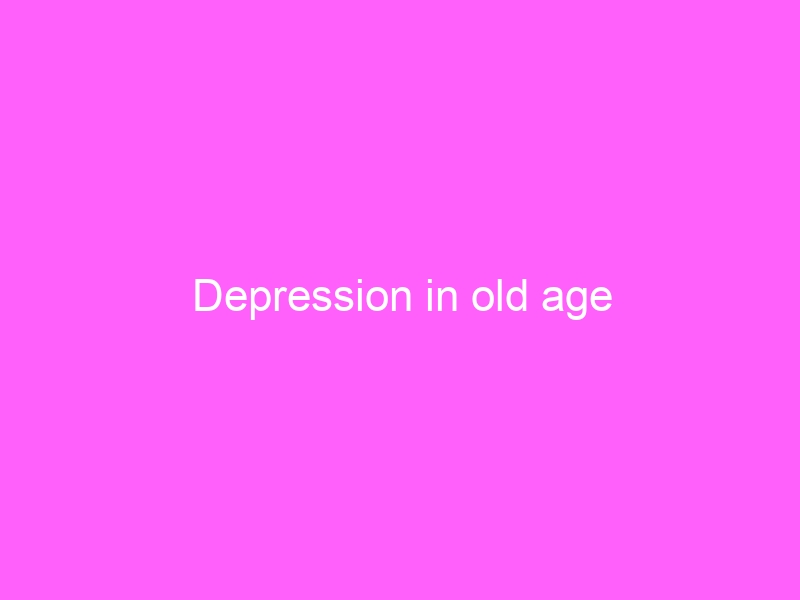Depression is the most common mental illness in old age. Considering that the population share of elderly people is increasing more and more, so get this disease more and more important. However, the disease is often undiagnosed – and therefore not treated. There are now many possibilities.
Causes of the great sadness Old people are often alone. The partner has died, many friends and companions as well. And good health have eased significantly, the ability to move self-determined life, are always lower. So depressed moods in elderly and old people seem all too evident, and a depressed mood and withdrawal are considered „normal“. An age depression is always a very serious disease that must be treated professionally must. It is believed that most of the approximately 12,000 suicides annually in Germany is due to depression. In recent years, a sharp increase in depressive disorders was observed, especially in highly industrialized countries. The reasons are not clear, but often are stress and strain blamed. The media pretend a world full of beautiful, young, successful people before. Is it even „just“ average or even old now, fast wide inferiority complex. For old people it is important to note whether physical causes do not play an additional role. Example, there are also medications that can promote depression as a side effect such as beta blockers or cortisone. Likewise, certain diseases such as Parkinson’s, dementia, diabetes, hypothyroidism but also promote nutritional deficiencies often times depressed mood.
But there are also the following situation: There are physical symptoms, their background, a true depression. (Also called masked or masked depression) in a somatisierten depression refers to a depressive mood, which is associated with physical complaints. This is called „Präsentiersymptomen“ depression. This may include: headache, leaden fatigue, sleep disturbances, impaired concentration, forgetfulness, joint pain, gastrointestinal problems, loss of appetite, increased infections, pressure feeling in chest and weight gain by comforting food. Unfortunately, few general practitioners are in the field of geriatrics (= medicine of old age) and certainly not in the field of geriatric psychiatry (= theory of mental illness in old age) trained sufficiently, so that depression patients are often referred from one doctor to another. To recognize the age depression is often not easy for a doctor. In many cases the victims do not go to the doctor for their depression. Mostly they look to their physician for other symptoms, such as:
- Headache
- Limb pain
- Sleep
- Concentration and memory problems
- Anorexia
- Fatigue
- Unrest
- Weight loss
Further symptoms can also occur even in old age depression: feelings of worthlessness, frequent thought about death and suicid. Less demonstrative, but common symptoms include the feeling of inferiority, helplessness and hopelessness, guilt, fatigue, reduced concentration and decision making, senseless thoughts circles, slower thinking, irritability, anxiety. Negative thoughts and impressions are overrated and not positive aspects perceived or considered to be random. With a major depressive episode may be inhibited the sick in his drive so that it no longer perform even simple activities like shopping or cooking can. Already in the morning getting ready then problems (morning low).
After the drugs were used to treat depression (antidepressants) feared controversial because of their severe side effects and there are now more and more well-tolerated drugs. Today you walk in the treatment of depression believe that the combination of antidepressants and psychotherapy works best gifts. Antidepressants do not take „just“ one for two or three weeks – and then it is good. So it does not work. Usually it takes two to three weeks to even a mood brightening and stabilization have been achieved, then the product should be taken for months. Some patients need the drug even a few years. Yet for at least six to twelve months, the drug is then added to prevent further relapses. Sometimes doctors and patients need to try several products to find the one that brings the patient the most benefit for the least side effects. Because in older people, the institutions are not as powerful, as is the case with younger people, are the effects of different drugs. In the often very different active ingredients, it is not uncommon to unwanted interactions. The processing of the drug in the body and the excretion of waste products are clearly changed. Also, care must be taken into consideration.
